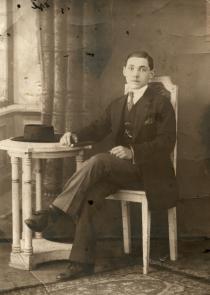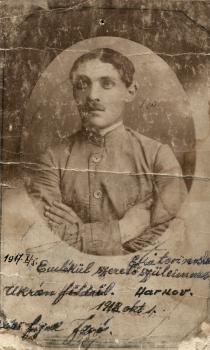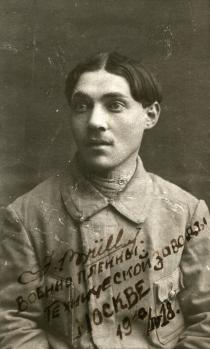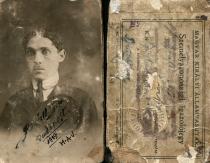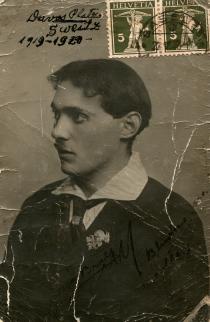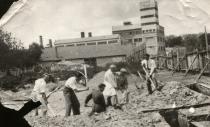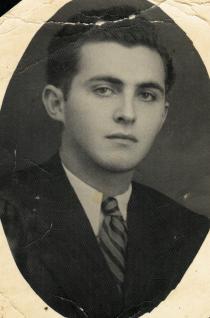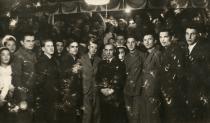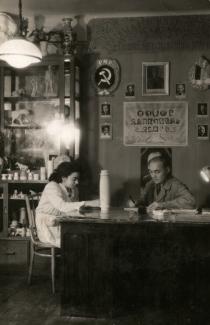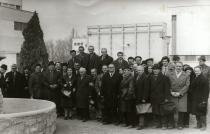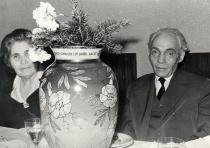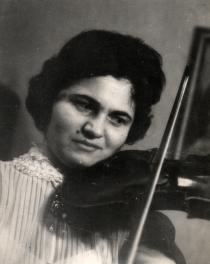
Silvia Nussbaum
Cluj Napoca
Romania
(Silvia did not know her grandparents which is why her knowledge is very limited). My maternal grandfather Bernat Nothi (1862-1940s), was a notary in a Maramaros village (a village documented as Valea Chioarului, now in Romania). My grandmother was called Fani Braun. She got married at 14, so my mother said. They lived a village life: they had cows, and such. They were really religious. Grandfather taught lots of children, held religious instruction classes. There were even people in Kolozsvar (now Cluj Napoca, Romania) who remembered him (who came from that village). He was famous in that community. Grandmother was also religious, she kept a kosher house. She must have had a wig, at that time she must have had. They observed
religious rules absolutely, at least in the village community. I don't remember anything else. I don't know why but (at the beginning of the 1920s) they suddenly went to Israel (many of the children from the family).
I know about our family but it's possible that others went (from the
village) too. (My mother) stayed here and got married.
There were seven siblings, one died. I know there was a boy: Marton, he was
the eldest (sibling). The boy lived in Israel for a while and then went to
America where he lived for a long time but I don't know what he did. Then
he returned to Israel. I saw him in 1985 in Israel. He was old by then. He
lived in an old people's home, in quite good circumstances and was
completely compos mentis. A few years after, I don't know when exactly, he
died. The others (siblings) were girls: there was a Nusi, a Blanka. They
all went to Israel. Only two stayed here. That means that there are lots of
relations but I didn't know anyone, I never saw them, I only knew about
them, right up until I retired, when it was possible to travel and to go to
Israel. I met their children aged 60. They were born there and only speak
Ivrit. The parents no longer know Hungarian. Anyway most of the parents did
not speak Hungarian but Yiddish, especially the (Maramaros) villagers. Even
the first cousins don't speak Hungarian, not to speak of their children and
grandchildren.
My mother (Zsofia Nothi) was born in 1900, she was the youngest, had a few
years of primary school. She must have been 18-19 when she came to
Kolozsvar. I suppose she came away from the village because of all the
children. She must have had a relation in Kolozsvar as they wouldn't have
let her go off like that (to the unknown). She worked in a factory, but I
don't know what, I know nothing more. After a while she met Izsak Brull.
There was six years age difference. She got married at 23, after they had
gone (her siblings to Israel). She was a housewife then.
I only know (about the paternal grandparents) that they were from
Banffyhunyad (Huedin in Romanian), they lived there but I don't know
exactly where. (The paternal grandparent was called Lorinc Brull). I don't
believe he was religious. There was a photograph of him when he was young
and he had a short beard. But he was a Cohen, as it is (written) on his
grave. I don't know what he did. Nobody told me. They died so soon. All I
know is that they divorced and Zali Friedman (my paternal grandmother)
married again and moved away from Banffyhunyad. (the new husband), Szabo,
was also Jewish.
They (the paternal grandparents) had two children (together): Izsak (my
father) and Helen (who stayed with their father). They had other children
too, who Zali took with her after the divorce to her new husband. Possibly
there were great age differences (between the children). I imagine that the
smaller children: Rozsi, Herman, Farkas, whom she took assumed her new
husband's name of Szabo. But I know of no other (later) relationship
between the two families. Herman went to America. Farkas lived in
Kolozsvar, he was deported.
My father Izsak Brull was born in 1894 in Banffyhunyad. He was a thin,
small man. In 1913-14 he graduated from the Applied Arts College (in
Banffyhunyad) and after went to war. He did not speak about the years when
he was called up as a soldier. He didn't speak about escaping from Russian
capture or his travels either. He did not keep up with (his parents, he
just sent a few photographs of himself). That's how the photos, which we
found after his death, remained in the family. From 1914 until the 1920s we
only know (about his life and travels) that which we could make out from
these papers and how he entered ceramics.
He came to Pest young. At first he attended the Industrial and Agricultural
College in Budapest. Then he was a turner and then made ceramics. In Pest
he worked at Zsolnai's and other similar factories (Editor's note: the
ceramics plant started by the Zsolnai Brothers was famous for its beautiful
ceramics and new techniques), but only to learn the skill. He worked in the
mechanic Kalman Vas' workshop too. He was also in Switzerland and leant
about ceramics there. Afterwards he came back to Kolozsvar and until 1935
was at Iris (the Kolozsvar porcelain plant). He got into the Kolozsvar
plant through some sort of mechanics contact, just as it was starting. He
was an intelligent, skilled, very flexible and quick witted man. He saw a
future as a mechanic in the porcelain factory. The factory was set up in
the 1920s, it was Romanian, that is with local capital. A lot of German
engineers were brought in from Germany to run it. (These engineers),
deliberately tried not to teach (the local employees). Because they got
much higher wages than in Germany. Nobody leaves Germany for Kolozsvar - a
completely strange place - for fun, only for better pay. They well knew
that the less they teach (people) the longer their high wages would last.
(My father) then, one could say, pilfered his mastery and learned how to
make porcelain. Slowly he developed into a technical expert at the
Kolozsvar porcelain factory.
In the factory he slowly switched from mechanics to porcelain making, and
worked himself up to become an expert, to the extent that he got noticed
and was taken up by a capitalist called Iliescu. He had a bank and a pawn
shop, today's Transylvanian Bank was his in the past. He had enough money to
say "Come to Torda" (Turda in Romanain) as I am building a porcelain
factory." And he promised high wages. And the agreement went as far as (my
father) saying alright. In 1935 he went to Torda when they were building
the factory. This porcelain factory building was new thing then. In Romania
they primarily wanted to build a factory which ran not on coal, wood or
coke but on gas. There was no gas in Kolozsvar then, it was only piped in
in 1945 after the war. There was gas in Torda (between the two world wars).
And the capitalist was counting on the fact that if he succeeded then he
could (run the factory) much cheaper on gas than on coke. It was a great
risk that Izsak ran doing this because there was no precedent. He could
have failed completely. He had to experiment with how porcelain reacted to
gas, as there were no rules, it had not been done yet. In fact they built
the (Torda) porcelain factory according to his specifications and
experimented with gas stoves and kilns.
Their apartment was right next to the factory, so that he did not need to
go out onto the street but cut a fence from the yard into the factory. They
had a phone put in too. The factory office phone was in his apartment, they
could phone from the factory at 2 in the morning too: "Uncle Brull please
come because the fire in the kiln is too red." He lived in the factory, was
only interested in it. His official title was "conducator technic al
uzinei" (factory tehnical manager). He ran the technical side of the whole
factory. One of his great achievements was the conversion of the kilns to
gas. His other - which also did not exist then in Romania - was electro-
ceramics. The factory converted to electro porcelain (instead of making
porcelain pots). High tension isolators are also made from porcelain and he
had to experiment with these. At the same time (he experimented) with pink
porcelain (its production methods). He was able to surpass, in many ways,
the older and well-known Kolozsvar factory (Iris porcelain).
My father was not religious, he worked on Saturdays too, but went to
synagogue on big holidays because of my mother. My mother ran a kosher
household. She observed the religion, to the extent that she would never
have eaten pork whatever. Even if there was nothing else. But later, we
(the rest of the family) ate it, but she never did. At Yom Kippur, even in
her old age, it was unthinkable that she would not fast. She would have
been sick if she had eaten. My mother lit candles on Fridays. She always
made us fish in aspic and cholent, goose liver and stuffed cabbage. They
did not enter Jewish society, did not befriend Jews. They were mostly among
Germans - colleagues and employees, - as they were in the factory. They
organized evenings, invited colleagues. My mother was very friendly with a
German family who had no children. They knew we were Jews but that did not
bother them. Then there was no difference, they did not make an issue of it
(of the nationality question).
My mother was very skillful and very daring, she was not scared of life.
She worked a lot, did housework for a very long time. Even at 86 she did a
big wash. She never complained. She did not have much time, did not bother
with us much. We had many charwomen, some for a long while. There was a
Hungarian girl - Etel Lorinci - who still lives here in Kolozsvar. In fact
she lived (with us), was brought up with us. Her mother brought her to
Torda when she was 13 to be a servant at ours. And there were others too,
but I can't remember them. My aunt (Helen Brull), my father's younger
sister, looked after us most. She was much younger than my father. We
really loved her. She often went from Kolozsvar to Torda and looked after
us. She was there, we did little washes for her, she played with us and
crocheted clothes for us. She did everything, was very skillful. She wasn't
married then and then she was deported. She came back and then got married.
She went to Israel, in 1982 perhaps.
I was born in Kolozsvar (in 1929, and we moved to Torda in 1935). I can't
remember what we did as children, we must have played. I had a girlfriend
Agi Schlosser, to whom I was always going although she lived at the other
end of town. I always went by bus. We were the same age, her father was
also a ceramicist. She could draw beautifully and was always drawing. She
is in Israel now, but we are not in contact. Or we went to the water's
edge. I was very religious as a child. I had a cousin, Edit, who told me
that if you transgress three times then you won't get to heaven. Then I
thought how many crimes I'd committed and became very religious. I would
have been capable of cutting my hair so that they should make me a wig. (I
was then 9 or 10).
There were five years between me and my brother. He was called Lorinc
Brull, and was also born in Kolozsvar. My brother played the violin, and I
really liked it. I studied it (the violin) at seven or eight with a private
teacher. She was Jewish and called Matild Laszlo. She was the only one in
Torda, so a small town violin teacher. She held lessons for pleasure. She
was rich, lived in several places. She had a house on the main square, I
went there for lessons. She had a lovely apartment. They also had a block.
They weren't religious. Her husband was a banker, called something Laszlo.
Her daughter was a violinist. I lived in that part (of town) where the
factories were - in the suburbs - and went into the centre for lessons
(which was quite a way). I went on foot, and always took my violin with me.
When I went for lessons I felt that it wasn't enough just to sit there. She
did not teach Jewish songs, just classical pieces, I even played in a
cinema with an accompanist before an audience. (Not before the film, just
in the building). The cinema had no name, it's a theatre today. This was
1940, I must have been 10.
My childhood friends were mostly Jewish - before the war - until I
went to high school. I could not have gone between 1940 and 45, during the
Hungarian period, (when the Hungarians annexed Transylvania) but I had
private lessons and took exams in the Jewish high schools in Temesvar
(Timisoara) and Bucharest. It was just that there was a Jewish High School
and they allowed us to take exams. Because here (in Torda) it wasn't
possible because of the racist laws. I could hardly wait to take exams, so
as not to lose the years. The school years were alright. There were books
at home I recall, it must have been possible to get them in the shops. I
was a private pupil, there was always someone to help me. One of them I
recall was called Zozo. She was a Jewish apothecary, older than me. She
taught me everything, mathematics for example. The rabbi's daughter - I
don't know her name - taught Hebrew, she knew it well. She must have leaned
from her father. She was a bit older and very cultured. She taught every
week once or twice, she had a text book. She did not teach prayers, we went
for the language, as we had to take an exam in Hebrew. And in drawing,
history, all the things which the others studied. A special exam was set
for private pupils. During the exams all the high school students (Jewish)
came in, and they all wanted to help so that I would be able to write down
what they (the teachers) asked. The school was strict, we didn't know as
much as they required for the exam. The teachers were fairly relaxed,
because we passed, that was the main thing. I sat the first and second
(high school exams) in Bucharest, the third and forth in Temesvar, I don't
know why. There was one other girl from Torda, Jutka Adonyi. My brother
took me to the exam, she (Jutka) went separately, because she had an aunt
in Temesvar. I was the only one in Bucharest. My brother always accompanied
me. We went by slow train, it was very long, it took 13 hours to Temesvar.
And the route was long to Bucharest too. There were steam engines and went
very slowly.
It was different for us at the end of the 1930s (than for Northern
Transylvania which was annexed to Hungary), because they let my father work
as they needed him. He was very diligent and lived for the factory. He was
very severe with the workers and always swore at them to work harder but
was one of them too. He was very just and honest. He always fought for
workers' interests. He did not ask for higher wages for himself but for the
workers. He was very modest, to the extent that the owner had to beg to
raise his pay. He always said - he did not speak Romanian well, had never
learned it - that "deti la muncitori, nu mie" (give to the workers not to
me). He did not want to be different from them, he did not want to be paid
differently. They always addressed him as "domnul conducator" (manager
Sir). The owner did not know what to do with him, to make him accept
something, then he bought (him) a house which was taken away from him (at
the state takeover), although they had no right to.
"Societatea Anonima" (this was the cover name for the factory) Iliescu, the
factory owner had to take on a female engineer from Iasi (in Moldavian
Romania) - (she was called) Elena Holban - as he could not keep my father,
(a Jew) as the chief. The woman did not understand porcelain manufacture,
she was a chemist, but on paper she replaced my father, who worked on. She
lived with us (she got a room). There were no other Jewish workers in the
factory (apart from my father). My brother even worked there for a while,
when there were anti-semitic things, so that he wouldn't be taken (to
forced labor), because then they took the Jews to Transnistria. He went to
work in Torda (posing as forced labor). In a word we did not feel (the
restrictions that preceded World War II). (Editor's note: as Torda was
under Romanian control the Jews were not deported).
On August 23rd 1945 Romania went across (to the Allies). This meant that
immediately afterwards the German troops sent reinforcements, they advanced
with Hungarian forces and occupied Torda. They took over the factory, over
everything that belonged to Romania and went forward. In the meantime the
Russians and the Allied Romanians advanced. So Torda became a frontline.
At the end of the war the Hungarians entered, and the Germans and we went
into the factory cellars (we hid there). My mother came up from the cellar,
up the steps for something and saw them taking our vase and carpets. They
took everything out of the house (and we saw it all) as we lived right next
door. Locals and soldiers took things away. And they took my violin, I
remember that. The German and Hungarian soldiers even slaughtered a pig in
the middle of the room. And they found prayer books (in the house) and came
into the cellar and said that if there were Jews, to hand them over
immediately. We were terrified someone would betray us. The others were all
Hungarians and Romanians, only we were Jews. People had run there from the
neighboring houses. It was war, there were no workers, no one worked (in
the factory then). So the Germans cooked there, baking bread in the
(factory) kilns. One of the Hungarians said that we should go with them if
we want to escape - because the Russians were coming - and they will take
us to Debrecen. So no one knew we were Jews. If they had they would have
killed us there and then.
Most of the inhabitants left (Torda). War was a time of fleeing, from
shooting. We did not go then. We only went when the Russians came in. Until
then we were (in the cellar). The big battle was just next to Torda,
Russians against Germans. Then some (of the inhabitants) fled to the
surrounding villages. They tried to flee to the villages of the Ore
Mountains and went on foot. In the first days, when there was shooting,
they obviously went into the cellars, and a few days after, when the front
was approaching they fled to the villages around Torda.
When the Russians came in they said there'll be a great attack. We were
hiding behind a door, they didn't know there were women there, or who, or
how many. And then we all processed out and set off on foot and we went
pretty far. My father did not want to come, he wanted to save the factory,
not let something happen to it. He stayed with Iliescu, they defended the
factory, they were afraid the Russians would get hold of it. He let us go
on alone. I went many kilometers with my mother. We fled to a village close
to Torda: Sinfalva, Cornesti in Romanian. My brother was elsewhere. He was
for a while an utecist (Uniunea Tinerilor Comunisti, the Communist Youth
League). He was a sympathizer of this illegal league and as such undertook
various tasks; but he wasn't a member. He fled to the mountains as there
were Russian partisans there. We found him with great difficulty, as he
came over there (to where we had fled). We had to take him up into the
loft, as they were looking for such "transfugo" (escapees), those who did
not go to fight. Then my father came for us in the village. When Torda was
liberated we returned. The apartment was robbed. A type of bomb (a
cannonball had smashed into the house) through the window, there was a
piano in one room and it had smashed into it. The rest of the apartment had
(just about) survived. When the war ended in 1945, I made up the time and
was able to complete my fourth year of school. Then I could go to high
school.
Lorinc (who often went to Temesvar for his exams) had a Jewish girlfriend
in Temesvar whom he courted. She was called Edit Kohn, she's now in Israel,
she got married to a doctor. (in 1945) it was not permitted to go into the
street after 6 pm, as there was firing between the German and Russian
soldiers that were still there. But (even so) Lorinc ran out for a minute,
as she (the girl) lived next door, and was shot down. Then people came to
tell us to go quickly as one from here (he had left from here) was lying on
the ground. (The whole family was very upset).
Luckily the factory was not badly damaged, and continued (its production).
Immediately after the war, when things were sorted out and (Transylvania
was under) Romanian authority, (my father) remained in a leading position.
He did a lot of (porcelain) exhibitions. And remained a "conducator
technic" up until the state-takeover. Then (in 1948) "they nationalized"
the factory and got rid of Iliescu. My father stayed. He didn't really like
it (the altered work situation) as they appointed managers who had no idea
about porcelain manufacture and (yet) began to give orders. After that I
went to Kolozsvar (to the music conservatory), and (my father also) wanted
to go there. But then they didn't really let one go from one town to the
next. (even so) he managed it with great difficulty, and came back to the
Kolozsvar factory, but not as a "conducator" (manager) but in a lesser
position. He was given the position of quality controller, and retired from
there. They wrote a lot about him (in the papers).
Despite the fact that he had come to Kolozsvar, his birthday was celebrated
every 5 years by both the Kolozsvar and Torda (porcelain factory work
communities). They liked him so much that they organized a joint dinner for
his birthday. This was rare (for a leading person), in general a person is
forgotten after 1-2 years. But they organized a party for him until he was
85 - that was the last one (as he was a great expert).
We met each other (Laszlo Nussbaum and I) at nursery and primary school, as
little boy and girl. But we were not in the same group (didn't play
together). At primary school we always had the same raincoat, I always
think of that. It was polka dotted and I was embarrassed to go into class,
that we had the same coat. When the war ended we went back to Torda (Laszlo
was later Silvia's husband, as a 16 year-old child he had been freed from
Buchenwald concentration camp. Nobody survived of his family in Kolozsvar
so he went to Torda, where one of his aunts and an uncle lived). I must
have been about in the 6th grade of high school and he entered the school,
and we got to know each other again. And he spoke Romanain well. Then he
always came to our house. (He listened all day while Silvia practised the
violin). My mother really liked him, as he substituted for my brother, (she
looked on him as a son). I did not know either his grandfather or
grandmother, only his aunt and uncle, as his aunt (Zita Weinberger,
Laszlo's mother's younger sister) was a piano teacher. Well she was a
lawyer but she taught piano. I played the violin and she accompanied. I did
not perform with her, she accompanied me at home. Sometimes I went to her
and we just played. Then both of us went to Kolozsvar to study, he went to
university and I to the Conservatory.
Laszlo Nussbaum, Silvia's husband tells that around 1949 there was great
hunger: there was no bread, nothing. Hunger was so great, especially in
Moldavia that many children were brought to Transylvania and put up for
adoption. After the war it was difficult everywhere and it was also very
dry. There was a canteen in the school and in the old houses there were
also rooms. They were much smaller than today's. They were not new. In the
first year Silvia lived in the metropol building with a family who had
converted to Christianity, they were called Wolf)
I was a second year (in 1952) when we got married (Laszlo had finished
university and was an assistant). There was no rabbi at our wedding, the
mayor married us. We lived in an apartment on the first floor of the Art
Cinema building. It had four rooms and four families lived in four rooms.
With a common larder and kitchen. Where we were there was a Jewish family
(our family), a Hungarian one and two Romanian ones. (these families) came
in (from the countryside) to Kolozsvar, as they wanted to work here.
Silvia's husband tells that when Silvia's parents moved back to Kolozsvar
in 1953-54, that is at retirement age - then a workers home, blocks near
the Kolozsvar porcelain factory were being built - and they were given a
small two-roomed apartment. In the meantime they started to build the
workers' blocks, including this block (where we live now). Then various
factories were given apartments, the factory (leaders) decided not the town
council, to whom to give them (of the workers). The factory had a list (of
the likely candidates), so that the factory organized (apartments) for the
workers. At that time I went to one of the managers and we got it (the
apartment) like that. I offered the apartment (where Silvia's parents
lived) and ours. And then we moved in together (into the present, third
apartment), there were five of us. This was at the beginning of the 1960s.
We both worked, what could we do with a small child (our son). And for
years my mother-in-law looked after him. My parents-in-law lived on the
factory site until then). So at that time this was a great solution, added
to which my mother-in-law cooked. It was very difficult for my wife, she
was with the philharmonic, they went on tour, organized concerts, she had
no time to cook. My mother-in-law was a housewife and she created a normal
life. We lived together in the flat: they lived in one room, my son in
another and we were in the third.
The mother and daughter were very different types of people. Her mother was
rather reserved, spoke little. Even her own daughter knew little about her.
In that period, when her son died, she did not even go out of the house for
two-three years. A few years went by and she slowly got her own self back,
and (became) a cheerful, optimistic, never complaining person. She did
everything for five people, today that's not so easy. We had no cleaner or
housekeeper and no washing machine. So she did washing, ironing, cooking
and a lot of shopping too. It only got easier when her husband retired. We
did not contribute at all, it was all taken on by her. But she even sang as
she ironed, never complained how difficult washing was. One person did
everything for five people, including big spring cleans. To the extent that
the child was never a problem. We only had to announce that we were going
somewhere. "Will you look after the child?", we went off for two months
with my wife on tour, I went to the sea, but it was never a problem.
Sometimes we went off and she used the opportunity (that the house was
empty) to paint the apartment before we came back. They died slowly (the
old), (Izsak Brull in 1979, Zsofia in 1996), the boy grew up and went, and
we remained behind together.
In 1955 I graduated from the Music Conservatory. It was good (to work at
the Kolozsvar Philharmonic) because we went on tour. It was only difficult
in that before 1989 we were cold, cut the fingers off gloves and played in
those. It was so cold that when conductors came from abroad they did not
want to conduct. They said that they couldn't in such cold. One bought
about 15 radiators so we would not be cold, and when he went they were all
collected up because a decree was passed - during Ceausescu - that
radiators were forbidden. It was hard to heat the rehearsal rooms as it was
very large and they didn't heat it well. So we froze as they were mean with
the heating during rehearsals and performances. Ceausescu passed a law
about conserving electricity. Otherwise they were good years, we were
abroad a lot. But we didn't get a big enough daily rate so we always took
tins with us and ate those to save money and to buy something for those at
home. Once, I believe in Italy, the boys cooked something in the hotel and
blew the fuses. There was a big row and articles were written (in the
papers there) about how the Romanain musicians live, and have to bring tins
(with them on tour). We went to many places. We were in France several
times, and in the ex-socialist countries: Bulgaria, Hungary,
Czechoslovakia, Poland and Russia.
There were some Jewish colleagues but not many. Ervin Junger in the piano
department. They were watched to the extent that one of them - Janos
Reinfeld, who was very talented and a soloist - was told that he could not
appear on the poster because he had a Jewish name. He is now in Germany,
before 1989 (during a tour) he "stayed behind". A lot of my colleagues did
that when we went on tour. Most of the orchestra was Hungarian, they could
not discriminate (between the Hungarians and Romanians). The atmosphere was
very good (during Communism between the Philharmonic musicians). Sometimes
they didn't allow someone to go abroad but not because they were Jewish or
Hungarian but because a security person had to go and there had to be a
place for them. Then they always left someone behind. Once they left me
behind just when we were going to Germany. And I asked why, because in
general they didn't allow those who had relations abroad. I said: "I have
no relations, they are all under the ground, or died in the gas chambers,
so why aren't you letting me go to Germany exactly?" And (without any
prompting) they said: we cannot allow you. I was always a little moved when
we played Jewish composers. But we did not play Jewish tunes specifically.
Jewish identity means (for me) that I was born one. It was often unpleasant
during the war. I thought of all the problems it caused: I could not study,
continue playing the violin. After the war I was quite proud that all the
best violinists are Jewish. Then I started to realize that it is not
something to be ashamed of. As they said that Jews were lazy, but it's not
true, so they twisted things.
Our son (Andras, who was born in 1956) is not circumcised. At the time my
husband didn't allow it, because he was afraid of losing his job. Then
everyone was Communist, and he was in the Party. Then they threw him out
the university (from his job as assistant), as he was in Hungary in 1956,
and when he came home, they threw him out for being in Hungary. Yet it was
quite by chance that he was there during the revolution. But at that time
his friend was also of the opinion that if he had a son he wouldn't
circumcise him. But later we regretted it. He still feels he is Jewish but
he cannot pray. Our son had Romanian friends at school, he was with them.
We only celebrated the Jewish festivals later when he was 16-18 years old.
At Pesach for a while my father read from the book and then Laszlo. My son
also went to synagogue on high holidays but otherwise not. He was a year in
Israel (Andras with his family in 1984) and learned Ivrit and it had a big
affect on him.
Silvia's husband says: my son met a Saxon girl from here (Transylvanian
German). They talked of getting married. I would have liked it better if he
had married a Jew. Mixed marriages are a problem, especially Jewish-German
ones. These two nations, since the Holocaust, are really removed from each
other. The in-laws met and the (girl's) mother said that she would really
like it if my son was married by a priest, She asked if I had any
objections. I said "It does not depend on me. It is up to my son, they are
getting married. But if you're asking me, I am very against it. I do not
ask for a religious wedding but I do not want him to leave the Jewish
religion. Let everyone keep their ethnicity, if they love each other they
will remain anyway." At this she said "Well I have no objections, let it be
a Jewish ceremony. I am very religious and I would like it of they do it
before God." A Saxon woman was capable of saying let it be according to
Jewish laws. I wouldn't have been capable of saying let's have a Lutheran
one. In the end they didn't have either. Let them be human and love each
other.
As far as I know their child did not receive a religious upbringing (Sonja
was born in 1982 in Kolozsvar), they did not christen her, but her mother
(Gerlinde, my son's wife) did make a Christmas tree. They do not observe
Hannukah and other Jewish holidays as my son is not religious. I said to my
daughter-in-law; "I wouldn't like my son to stay in Romania, as there is no
future for him here." And so it was, I didn't know whether I would see him
again but I was willing to let him go. I said there is one possibility (for
this) Israel.
They went to Israel with the child (in 1984) - on my advice -, and they
were put into language courses and special terminology courses. My son's
wife Gerlinde, a really German name. As the mother is not Jewish, neither
is the child. My granddaughter is Jewish everywhere in the world except
Israel. In Israel they got jobs, my daughter-in-law worked near Haifa in
Kirjat Jearim. No one ever asked my daughter-in-law if she was Jewish or
not. Of course not, because they really respected her. But my son did not
like it so much because of his colleagues, not (because of) Israel. In the
3rd-4th month in Israel they got a paper from the German Embassy saying
that they can go to Germany to settle. They did not understand why. Then
they got the answer, his wife's entire family were in Germany and had
arranged it, in that she was of German origin. They got to know that she
(Gerlinde) had gone from Romania to Israel (the embassy there had told
them) and within 6 months they went from Israel to Germany. My son is a
specialist in internal diseases, his wife is a planning engineer with a
company, (they live very well). My son visits the Stuttgart Jewish
community (where they live) but he does not have any position there.
I retired in 1986. Since then I am a pensioner. Until 1996 we could do
nothing else (with my husband) but look after my mother as she had
sclerosis, (and apart from this) had problems with her legs, as she fell
down. Neither of us works now, We were in Israel for the first time in 1994
or 95. I do no take part in the religious community but am a member of it.
My husband sometimes gave lectures about deportation within the community.
Now we only go to synagogue on high holidays. When there is a holiday -
Pesach, Purim - we eat at the community canteen as they organize joint
meals there. We go to be with other Jews and not because of the kosher
food. We eat paska then. We also celebrated Yom Kippur this year: we went
to synagogue, heard them (the prayers), but as they pray in Hebrew we did
not understand much.
Perhaps life is easier now, economically better. My husband gets some help
from Germany as he was deported. My son comes every quarter, he always
comes (from Germany) for my birthday. Most days I cook at home and
sometimes read.
Interviewer: Ildiko Molnar
